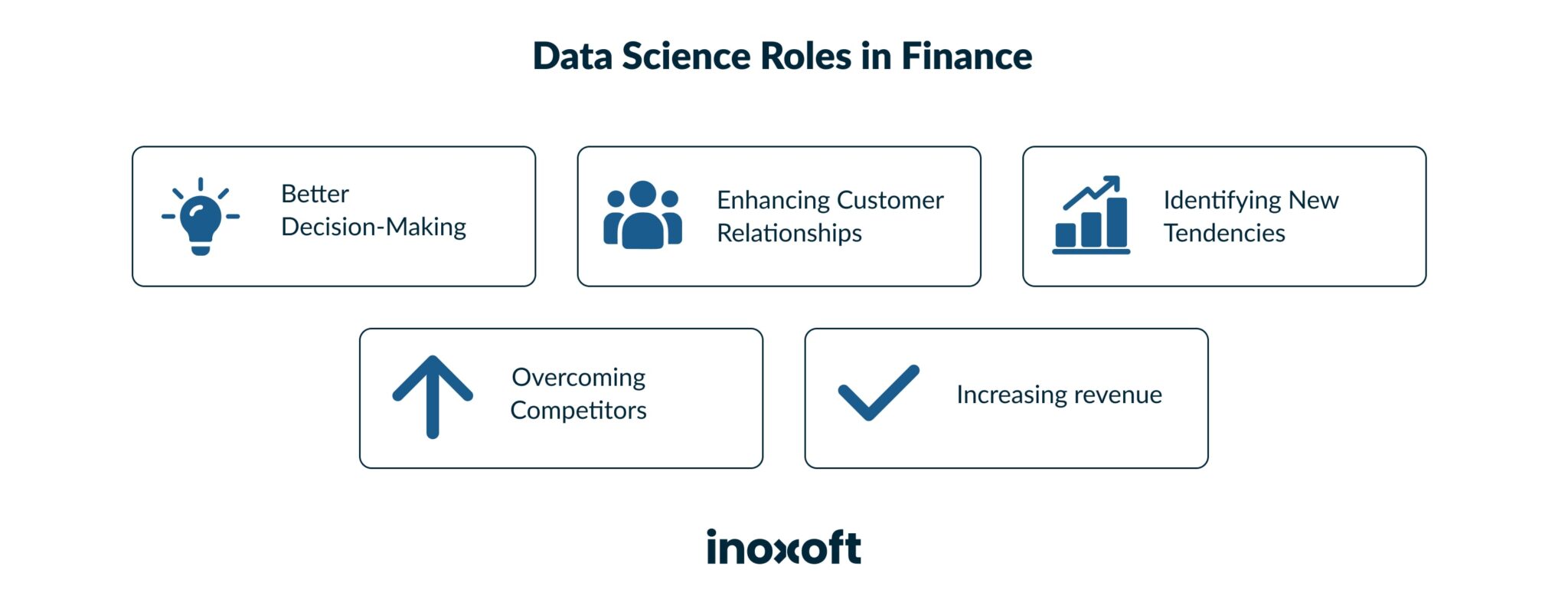In the age of digitalization, data science has become an increasingly important phenomenon. Gaining domination in various fields, data science also proves to be the driving force in the financial domains. IBM states that almost 60% of all data science and analytics job demand remains in finance and insurance.
Indeed, with such loud statements, we may consider data science a foundation of present-day business, especially the financial one. Yet, is it really that necessary? In this article, we will find the answers to the question: "Why is data science important in finance?", discuss its benefits, use cases and possible challenges.
- Understanding Data Science
- Data Science Roles in Finance
- Better decision-making
- Identifying new tendencies
- Enhancing customer relationships
- Overcoming competitors
- Increasing revenue
- Data Science Use Cases in Finance
- Fraud detection
- Algorithmic trading
- Client analytics
- Risk analytics
- Personalized services
- Trend forecasting
- Investment management
- Task automation
- Scalability
- Real-time analytics
- Challenges of Using Data Science in Finance
- Fraud risks
- Data security
- Heavy regulations
- Try Inoxoft’s Data Science Analytics Services
Understanding Data Science
Data science is a versatile field that focuses on extracting valuable insights from structured and unstructured data. The first includes customer data, polls and surveys, while the second consists of log and media files, social media usage information, IoT, etc. This discipline depends on algorithms, statistical methods, visualizations, calculations and data analytics. In other words, data science is a set of data collected by various methods, operations, techniques and tools.
Looking at the data scientist’s agenda, we see the development process for collecting, storing and mining data. They are responsible for outlining only the valuable data and providing strategic solutions based on the extracted insights. Data science is the new way of reviving and interpreting data to deliver the best relevant solutions — and all of that is possible thanks to machine learning, Big Data and data engineering. The data processing allows you to receive profound and valuable information.
In fact, data science has become a vital element of various industries: healthcare, eCommerce, Big Tech, media, manufacturing — the list goes on and on. Nevertheless, we will focus on the industry that is probably the first to adapt to the latest developments – finance. We may consider data science in finance-related sectors as a must integration — its usage, convenience and necessity are highly appreciated by banks, fintech and insurance companies, investments, accounting and others, since the achieved data comes in handy while forecasting future scenarios and developing patterns for their client base or entire network.
Data Science Roles in Finance
Financial data science consists of advanced econometric and technological methods, which, in their turn, help provide rational ways of solving the disturbing problems related to financial data and analysis. The usage of machine learning, artificial intelligence, predictive and prescriptive analytics helps enhance the industry and bring it to another level! So, what are the data science roles in finance? The examples are coming up next:
Better decision-making
Financial institutions are often in doubt regarding the appliance of technologies due to security hazards. It’s not a secret that the ever-growing cases of cybercrimes and fraud are the number one concern of financial institutions. Yet, the use of data science in finance is a pivotal step to better understanding and comprehending financial risks. Since this method is driven by predictive and prescriptive analytics, detecting suspicious and irregular behaviors, like transactions and other operations, has become much more feasible.
With the help of risk management tools, companies can decrease and even prevent the number of unfortunate events. Those insights greatly help the analysis of the client base, their transaction and credit history, trustworthiness, etc. This way, the business reaches the enhancement of security. In addition, it happens to solve the problems with the most beneficial scenarios.
Identifying new tendencies
The rapidity of identifying the drawbacks and implementing state-of-the-art innovations is what keeps the business afloat. And, luckily, the data-driven approach is an excellent way of collecting data from various sources. Hence, you’ll be able to discover your audience’s reactions to different services and improve them in a heartbeat.
The sooner the problem is solved, the happier the customers are, hence, data science in finance is used to increase production efficiency and maximize performance quality. Thanks to that, the companies can either update their existing tools or integrate new ones. So, they will absolutely meet their customer’s expectations and provide solutions that would fit the users like a tailor-made suit.
Enhancing customer relationships
In the most critical situations, the industry requires high-quality interactions and connections with customers. Thus, one of the significant roles of data science in the finance industry is examining customer experience and engagement. The personalization of financial management is what people desire to have! Even though it happens through the screen of their smartphones, customers would like to achieve a unique approach that would fit them perfectly.
Thanks to data science, you can analyze customers’ behavior, actions, habits, preferences and other valuable insights. The extracted data comes in handy while conducting different experiments, such as the A/B test, for instance, to understand the optimal fees for users. All of that helps create the right way of improving each customer’s digital experience and making the business more lucrative.
Overcoming competitors
Another vital role of data science is helping outdo your business rivals. With the help of data science, financial companies can track current marketing trends. Additionally, they can analyze what potential customers are fond of today and what they adore or despise. This way, the business can invest in developing a particular feature to increase engagement or change the execution plan of features that are bound to fail.
Implementing data science for finance is an incredible way to maintain a competitive edge. Financial companies can discover their customers’ behavioral and sentimental factors related to their offerings. Therefore, it will help enhance companies’ services and retain the remaining customers and attract new ones! Data science also comes in handy while analyzing the overall market and competitors’ approach to managing business operations. Who knows, you may even entice their clients to your firm.
Increasing revenue
Summarizing the above, using data science for finances increases the performance of the services, customers’ experience and the company’s reputation. All of that can only mean one thing – business profitability! Indeed, users are eager to choose your services if you value them most. Therefore, data science turns out to be a great help in devising user-centric products which is exactly what customers would like to purchase.
The duo of data science and finance works just harmoniously as you would wish! The constant analysis of market trends, customer reviews, comparison with competitors and older versions — everything is accessible with some help from data science. Honestly, we may consider the fulfillment of cutting-edge tools to manage data as the most cost-effective investment. With such benefits, it’s more than likely to pay you off.
Data Science Use Cases in Finance
Data science in finance means the application of machine learning and statistical techniques to financial data sets to solve problems. Thanks to it, the finance industry can comprehend all the data they have to decrease the possibility of risks without huge losses. The financial sector can also understand the possible hazards, like recessions and economic crises, with the help of data science.
The list of data science use cases in finance includes:
Fraud detection
Since the danger of becoming a fraud victim is increasing, financial institutions want to become as robust as possible. And luckily, examples of data science in finance include the instant identification of suspicious transactions and operations. To do so, they use rule-based models to distinguish legal transactions from ones that might look unusual or abnormal.
The developed algorithms can process big sets of data to spot correlations between customer behavior and the probability of fraudulent activities. Hence, finance-oriented companies obtain systematic data science techniques to identify and prevent roguish actions. For instance, in case of spotting a failed attempt to receive access to some secured service, the bank can temporarily block customers’ accounts due to safety reasons.
Algorithmic trading
As a matter of fact, financial data science produces, basically, the most crucial element of finances — algorithmic trading. In simple terms, those are complex mathematical formulas and high-speed computational methods. Financial firms use algorithmic trading to design brand-new trading techniques. What’s more, a large number of data sets are pivotal in the sense of calculations which leads to forecasting the company’s future.
Algorithmic trading includes data streams and a model to underline, define and measure them. Such an analytical engine generates the predictions after instantly processing the data sets. In addition, algorithmic trading provides high-frequency trading that manages to place multiple orders simultaneously!
Client analytics
Data science applications to the finance industry help ensure that every client receives personalized services — it helps financial institutions figure out their customers’ lifetime value, boost sales and increase the quality of their efforts.
Some companies can use data science to decrease losses by eliminating below-zero clients. The classification of users based on their personal characteristics, like financial status, demographic information, and loan history, is available thanks to data science. Such factors make it actually possible to create custom support targeting certain client groups.
Risk analytics
Financial institutions’ security and risk management hinges on data science with rather new tools, such as Machine Learning and Big Data analytics, that are on their way to becoming traditional ones. The possibility of extracting data in real-time makes it more accessible to see the current conditions of the organization’s processes.
Using client, market, and financial analytics, data scientists can monitor risks within organizations. This way, companies will be able to make strategically beneficial decisions toward the security and safety of internal and external data. Plus, they can embrace preventive methods to ensure they won’t become bankrupt! Moreover, data science in the finance industry is a fantastic tool to predict possible risks and create algorithms to avoid them in future.
Personalized services
Nothing enhances the relationship between financial institutions and their customers more than the individual approach. Using data science for finances helps achieve the related data to their online interactions, purchases and other vital information. Additionally, data science happens to efficiently process all the data, including user’s preferences, likes, dislikes and usual behavior, in no time.
Data science in finance provides important structured and unstructured data to process and analyze thoroughly. The best technologies to increase clients’ engagement include natural language processing, voice recognition, text analysis, data mining, etc.
Trend forecasting
Trend forecasting is a crucial aspect of data science in the finance industry — it involves using historical data and advanced analytics techniques to predict future market movements, asset prices, and economic conditions.
Data analysis techniques include time series analysis, linear programming, regression models, and machine learning algorithms. They facilitate the identification of concealed patterns or characteristics within extensive datasets, which enhances the accuracy and ease of trend prediction for financial institutions.
Investment management
Businesses employ data-centric strategies to fine-tune their investment portfolios and leverage predictive models, like financial forecasting, to project forthcoming returns grounded in historical performance. These projections empower investors to optimize gains while mitigating potential risks.
Beyond offering foresight, data science applications in finance develop and optimize trading strategies, using historical and real-time market data to execute trades at optimal times and prices.
Task automation
Data science emerges as a crucial ally in implementing process automation. Data scientists craft tools that enhance established workflows within the finance sector with illustrative examples encompassing speech-to-text, image recognition, and natural language processing. Thanks to that, the finance industry streamlines operations, reducing human errors and expediting processes for heightened efficiency.
Scalability
Data science provides valuable solutions and insights that enable companies to pinpoint the areas that require scaling, which comes in handy while making decisions about recruiting additional staff or investing in new equipment.
A notable illustration of leveraging data analytics for scalability is exemplified in IBM’s HR Attrition Case Study, where IBM effectively addressed its scaling challenges by harnessing the power of data science to scrutinize trends and forecast future outcomes.
Real-time analytics
Concluding our discussion on “How data science is used in finance”, we wouldn’t dare to skip another from the “analytics” clan, real-time analytics is the fundamental data science operation. All the detection of unusual processes, possible problems, and even the forecasting algorithm results from real-time analytics.
Big data analytics in finance has certainly become inseparable, making both of those a single whole. The prompt access to the data solves the problem of processing irrelevant and outdated information. Furthermore, it allows us to make the most favorable business decisions to satisfy clients needs and boost the project’s success.
Challenges of Using Data Science in Finance
Despite obvious advantages, data science, unfortunately, might bring you some hard times. The truth is that operating vast volumes of data rarely means an effortless task. Yet, what are the main problems you should keep in mind when thinking about the flawlessness of financial data science? Let’s review a brief rundown of the biggest challenges you might face.
Fraud risks
As previously mentioned, fraud issues are one of the most significant concerns of the financial industry. Even though we’ve talked about it several times, there’s no need to underestimate the malignancy of results the fraudulent activities might cause. The possibility of detractors hacking your finance system is higher than you think. The frauds will constantly try to create a fake account with a stolen identity to apply for a loan. With automatic management, you might relax a little bit too much and accidentally make it slip.
Data security
Certainly, there are plenty of ways of collecting financial data. However, what is the indicator of their safety? Another vital concern for financial data science is accessing the data sets appropriately according to compliance requirements. With the integration of third parties, in our case — data scientists, it’s crucial to ensure permanent security and compliance with data protection regulations, for instance, a GDPR. In other cases, the situation might lead to financial penalties and audits by regulatory bodies, which will cost a fortune.
Heavy regulations
As much as being an advantage, the heavy regulations of the financial industry might bring minor (or not) inconveniences. Absolutely, such measures are meant to prevent illegal activities and protect the privacy of sensitive data. Still, data science in this environment requires precise explainability for such fairness-focused regulations. A possible inaccuracy of the most explainable models, aka white box models, is the main reason for the data scientists’ frustration.
Try Inoxoft’s Data Science Analytics Services
If you are interested in applying data science to your business — count yourself lucky! Inoxoft is an international software development company that provides data science analytics services. Based on our solid experience in the field, we offer the best big data services on the market. That includes big data in the financial sector, data analysis services for logistics, healthcare data analytics, and big data analytics services in education.
Aside from analytics services to extract valuable insights, we provide custom fintech software development services! Thanks to that, your business can resolve its automation challenges, leverage trading success, and digitize banking services. Inoxoft aims to contribute to financial technology through investigation, advancements, and dedication to clients’ ideas and business needs.
Frequently Asked Questions
What skills and expertise are needed for data science in finance?
- Proficiency in Python and R
- Strong statistical and mathematical skills
- Deep understanding of finance concepts, instruments, and markets
- Expertise in data manipulation tools and big data technologies
- Effective communication skills
- Knowledge of machine learning techniques
- Awareness of regulatory and ethical considerations in finance
Why is data science important in finance?
Financial data science consists of advanced econometric and technological methods that help provide rational ways of solving the disturbing problems related to financial data and analysis.
How to use data science in finance?
We've listed 6 examples of data science in finance:
- Fraud detection
- Algorithmic trading
- Client analytics
- Risk analytics
- Personalized services
- Real-time analytics
Read the article to get more details!











